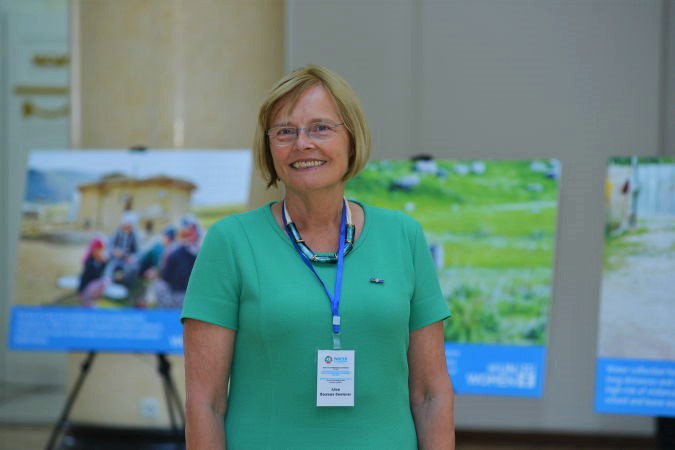In the words of Alice Bouman Dentener “To make sustainable development a reality, we have to move from vision to action”
Date:
Alice Bouman Dentener is based in The Hague, in the Netherlands and runs her consultancy company Diploria, which provides sustainable development solutions to a variety of clients from both governmental and non-governmental organizations. She was the founder and president of Women for Water Partnership (WfWP) for 10 years and the Steering Committee Member, Vice-chair and Chair a.i. of the Global Water Partnership, which is a global inter-governmental organization with over 3000 partner organizations in 183 countries. She recently moderated UN Women’s “Women Water Forum: Bridging Voices to Actions” and contributed to the outcome document ahead of the High-level International Conference on the International Decade for Action “Water for Sustainable Development” 2018-2028 in Dushanbe, Tajikistan, where she is a member of the International Steering Committee.

The 2030 Agenda for sustainable development talks about and “all-of-society engagement and partnership” and “no one left behind”. Living abroad I witnessed women’s organisations working under very difficult conditions with very little funding, making a big difference in their communities. Those voices were not heard at the global level and policies and programmes about them are made without them. I thought it was high time to make bottom-up and top-down meet. This meant first and foremost creating awareness at the global level where states and international organisations agree on a common development agenda.
Working abroad in developing countries, I realized how gender inequalities hamper and prevent women from living productive lives and developing their potential. I also saw how crucial water is for the development of communities and especially for women. When you ask women about their priorities, they talk first and foremost about having sufficient water for their families and for their economy. Women are quite capable of thinking about these issues and have loads of ideas. One does not develop people, people develop themselves. All they need is the preconditions to reach their full potential. That’s how Women for Water Partnership came about.
In 2000, the World Water Forum came to The Hague and the world geared up to develop the World Water Vision for the 21st century. But it was designed and developed without consulting women, half of the world’s population. That made me realize how wise it would be to unite the voices of women around the world and make our different voices heard.
To make sustainable development a reality on the ground, we have to move from vision to action. My priority is to strengthen and support women’s civil society groups. You can have nice policies but if the persons are not empowered, they cannot participate on an equal footing in the multi-stakeholder partnerships for water and sustainable development; and their situation will not change.
Governments need to create an enabling environment for women to deliver. In my experience, water is the most effective empowerment tool because it’s not threatening. No local leadership will ever deny that women play a key role in the provision and safeguarding of water. If women are empowered to be agents of change in water development, they will work with everyone in their community, including the local leadership, and will create change.”